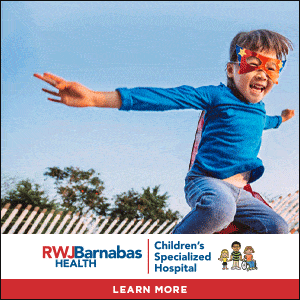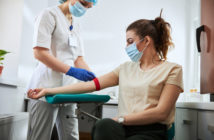You may have heard about RSV, the shorthand for the respiratory syncytial virus, and how cases have been ticking up in the last month, especially among young children. And add that to the flu and COVID cases, and it’s hard to know what is what when your child feels sick or even has a little stuffy nose. To help understand how RSV is different from other viruses, what to watch out for, and how to treat it, we asked two specialists from Cooperman Barnabas Medical Center—Dr. Uzma Hasan, Division Director, Pediatric Infectious Diseases, and Dr. Anas Al-Turki MD FAAP., Pediatric Pulmonologist—what every parent should know about RSV. (featured photo credit: istock/PeoplesImages)
Please explain RSV and why there is a rise in cases right now.
Dr. Hasan: Respiratory syncytial virus (RSV) causes upper and lower respiratory tract infections, and premature infants, infants with chronic lung disease, those with underlying immunodeficiency, and severe asthma are most vulnerable. This year we are seeing a significant surge in RSV. We think this may be because we had COVID preventive measures like masking and social distancing the last two years, so we didn’t see the usual spread of viruses. Most children have mild illnesses, but some can have progressive illnesses, such as bronchiolitis (inflammation of the lower respiratory tract), requiring oxygen and supportive care in the ICU. Many of our system ICUs have been at capacity, and many children are being seen in the ERs for respiratory illness, not just from RSV but flu and other viruses.
How do I know if it’s RSV vs. Flu vs. COVID? What’s the difference between the three?
Dr. Hasan: RSV typically presents with significant nasal congestion and cough, and sometimes with wheezing with a lower respiratory tract infection like bronchiolitis or pneumonia. With COVID, for the most part, we see mild or asymptomatic illness in children—croup, nasal congestion, cough, loss of smell and taste, vomiting, and diarrhea. With influenza, we see high-grade fever—children feel miserable, have nasal congestion and cough, and may have severe body aches. Children under two risk severe complications from flu, pneumonia, heart, brain, muscle inflammation, dehydration, and sinus and ear infections.
What are the signs of RSV? Should I immediately call my doctor?
Dr. Hasan: Typically, RSV will present with a runny nose, cough, and sometimes wheezing. If your child is a high risk, i.e., an ex-preemie with chronic lung disease, cardiac disease, severe asthma, or immunodeficiency, they must be seen by their pediatrician. If they show increased work of breathing, retractions, wheezing, and decreased oral intake, they should go directly to the ER.
Dr. Al-Turki: RSV can get very aggressive in infants quickly, resulting in hospital admissions, the need for oxygen, and sometimes a ventilator. Kids with asthma are more sensitive to viruses, including RSV, and you should call your doctor immediately if they get exposed.
What can I do to alleviate the symptoms and keep them from worsening?
Dr. Hasan: Hydration and supportive care like fever-reducing medicine, nasal suctioning, and saline irrigation to clear the passages. In the hospital setting, the children often require oxygen and supportive care, including frequent nasal suctioning. Illness peaks on days 4-5 of the onset of symptoms.
What are some of the symptoms I should be worried about? How will I know if they are serious?
Dr. Hasan: If they’re breathing fast, you see chest tugging or belly breathing, or if you see decreased oral intake or wheezing. If you see they’re turning blue around the lips, seek care immediately. Infants can rarely present with apnea.
Dr. Al-Turki: You need to see a specialist if symptoms are troublesome, like recurrent wheezing, recurrent shortness of breath, or as deemed by the primary care physician. Typically, all kids who need admission to pediatric intensive care should be seen by a specialist.
What can I do to prevent RSV?
Dr. Hasan: RSV is transmitted through contact with contaminated secretions and can also be spread through contact with surfaces contaminated by secretions. Practice strict hand hygiene and cough etiquette and wipe down high-touch surfaces with germicidal wipes. If a household member is sick, it’s suggested that they mask until symptoms are significantly improved and they’re fever-free for 24 hours. Extremely premature infants, those with chronic lung disease, underlying congenital heart disease, or severe immunodeficiency are eligible to receive Synagis, a preventive monoclonal antibody given once monthly x 5 doses at the start of the RSV season. Parents should discuss with their doctors if this is an option.
Can a child develop asthma after having RSV?
Dr. Al-Turki: It’s unclear if a child can develop asthma after RSV. However, some studies suggest that kids infected with RSV are more prone to recurrent wheezing in the subsequent years.
Please add any additional advice to parents during this season.
Dr. Hasan: I would ensure children are up to date on their flu and influenza vaccines. Flu vaccine efficacy is around 45-60%, and vaccination prevents severe illness and mortality.
This post is sponsored by RWJBarnabas Health to help make every #NJMOM her healthiest.
Become an NJMOM Insider! For all the best things to do with your family around New Jersey, be sure to sign up for our weekly newsletter delivered right to your inbox each week, and don’t forget to tag your photos #NJMOM and @njmom for a chance to be featured on our social media.








